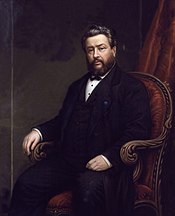 Continuing an occasional series on quotes from the Reformed Baptist preacher, Charles Haddon Spurgeon, today’s post concerns his insights on Matthew 7:6.
Continuing an occasional series on quotes from the Reformed Baptist preacher, Charles Haddon Spurgeon, today’s post concerns his insights on Matthew 7:6.
Previous entries on Spurgeon’s sayings include ambition, eternity and unity, growing old as well as reconciliation and strained relationships.
Spurgeon would have used the King James Version of Matthew 7:6:
Give not that which is holy unto the dogs, neither cast ye your pearls before swine, lest they trample them under their feet, and turn again and rend you.
The ESV has this version:
Do not give dogs what is holy, and do not throw your pearls before pigs, lest they trample them underfoot and turn to attack you.
Precept Austin has put together a helpful set of commentary and translation on Matthew 7:6. Spurgeon’s thoughts — as well as Charles Simeon’s — are there. I covered Simeon’s on Tuesday of this week. Both agree that there is a time and a place for a certain manner and depth of preaching.
Spurgeon advised (emphases mine):
There are some holy enjoyments, some gracious experiences, some deep doctrines of the Word of God, which it would be out of place to speak of before certain profane and unclean persons. They would only make a jest of them; perhaps they might persecute you on account of them. No; holy things are for holy men; and as of old the crier in the Grecian temple was wont to say, before the mysteries were performed, “Far hence, ye profane!” so sometimes, before we enter into the innermost circle of Christian converse, it would be well for us to notice who is listening.
——————–
Zeal should always be tempered by prudence. There are times when it would be treason to truth to introduce it as a topic of conversation,-when men are in such a frame of mind that they will be sure rather to cavil at it than to believe it. Not only speak thou well, but speak thou at the right time, for silence is sometimes golden. See that thou hast thy measure of golden silence as well as of silver speech.
——————–
When men are evidently unable to perceive the purity of a great truth, do not set it before them. They are like mere dogs, and if you set holy things before them they will be provoked to “turn again and rend you”: holy things are not for the profane. “Without are dogs”: they must not be allowed to enter the holy place. When you are in the midst of the vicious, who are like “swine,” do not bring forth the precious mysteries of the faith, for they will despise them, and “trample them under their feet” in the mire. You are not needlessly to provoke attack upon yourself, or upon the higher truths of the gospel. You are not to judge, but you are not to act without judgement. Count not men to be dogs or swine; but when they avow themselves to be such, or by their conduct act as if they were such, do not put occasions in their way for displaying their evil character. Saints are not to be simpletons; they are not to be judges, but, also, they are not to be fools.
Great King, how much wisdom thy precepts require! I need thee, not only to open my mouth, but also at times to keep it shut.
——————–
It is a pity to talk about some of the secrets of our holy faith in any and every company. It would be almost, profane to speak of them in the company of profane men. We know that they would not understand us; they would find occasion for jest and ridicule, and therefore our own reverence for holy things must cause us to lay a finger on our lips when we are in the presence of profane persons. Do not let us, however, carry out one precept to the exclusion of others. There are dogs that eat of the crumbs that fall from the master’s table. Drop them a crumb. And there are even swine that may yet be learned; to whom the sight of a pearl might give some inkling of a better condition of heart. Cast not the pearls before them, but you may show them to them sometimes when they are in as good a state of mind as they are likely to be in. It is ours to preach the gospel to every creature; that is a precept of Christ, and yet all creatures are not always in the condition to hear the gospel. We must choose our time. Yet even this I would not push too far. We are to preach the gospel in season and out of season.
Oh! that we may be able to follow precepts as far as they are meant to go, and no further.
Spurgeon spoke to such a wide variety of people — not only in a church or at outdoor appearances, but also in small, conversational settings — that he would have been able to discern who could and could not receive Gospel truths and in what measure.
As with Simeon, he is advising us to assess our audience carefully, even among friends and family. It is important that we not open the Christian faith to ridicule or violence. Let us leave alone those who might react against our speech and wait for an opportune time, as God wills it to His divine purpose.
Next week I will feature an application of Matthew 7:6 in conversation. It’s a true story and one to keep in mind.





2 comments
August 4, 2016 at 9:59 pm
The True Light!
Many very good points, my friend! Another article well done…
Steve
LikeLike
August 6, 2016 at 9:45 am
churchmouse
Thank you very much, Steve!
Enjoy your weekend!
LikeLiked by 1 person